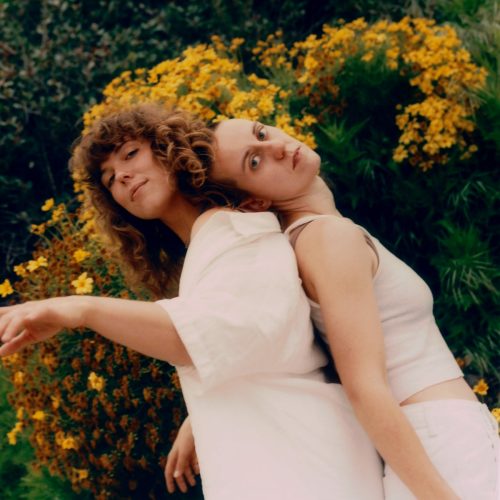Bernie (Sarah Bernstein) and Kaycie Satterfield’s recent collaboration, “Stay,” alternates between creating moments of timelessness and evoking the march of days.
Appropriately, it’s a love song.
Somewhat unusually, it’s a love song focused on ordinary times.
The lyrics contrast love’s way of measuring time with standard measurements. The singer observes “People on the corner selling roses / For the wedding and the funeral” – flowers to mark special occasions, ceremonial junctures, starts and stops. But the singer decides, “I’ll buy them and I’ll put them on the table in the morning.” Instead of using roses to mark beginnings and ends, love bestows them on the middle. An ordinary morning becomes a ceremony, because it is an opportunity to surprise the beloved with flowers.
The verses have a jaunty walking rhythm. This rhythm generates momentum that matches the lyrical focus on daily activity and time passing: “It’s funny how you blink and then it happens.” Flower-sellers observed, a move to California contemplated and maybe undertaken: the present becomes the past, and suddenly the future is all around.
A rhythmic change on the chorus floats it free from the rest of the song. Each measure of three beats feels self-contained; the rhythm isn’t really going anywhere. There’s a feeling of déjà vu, as if time is running in a small three-beat loop instead of in a line. As in the verses, this rhythmi choice emphasizes the lyric message: “Don’t stay for a moment / stay for a hundred years.”
This song’s sonic palette emphasizes the giddy speed of time’s passage. It’s full of electronic bleeps and blips, the guitar distorted to the texture of highway noise. The atmosphere feels like the set of a sci-fi movie, some pastel-toned futuristic city skyline, with this song playing out of the window of a flying car. The suggestion: let’s still be together when the world sounds like this.
The request (or instruction) is not to stay forever, only one hundred years. That’s still a long time, a full cycle, long enough for everything to change.
But it exists within time; there is an expiration date.
One hundred years is just past what’s reasonable to hope for in a human lifespan, right on the edge of being possible, but not quite within reach for someone already old enough to write a love song.
What’s the point in asking for something impossible? Aren’t you setting up your loved one to let you down? Doesn’t asking for love to be counted out in centuries undermine this song’s celebration of daily moments?
Maybe when you ask for the impossible, you can call it into actual being. It’s not possible for the singer’s beloved to stick around for as long as requested, but they may find it necessary to invent a way. The edge of what’s possible is stretched in love. Even if all you’re asking is that someone still be there in the morning, you’re asking them to create a shared future. Asking someone to stay, not just “for a moment” but for the long haul, is asking them to make the future real.







